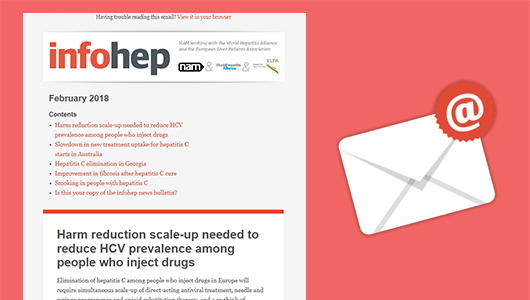The World Health Organization (WHO) has called for greater commitments to scale up hepatitis C virus (HCV) testing and treatment services to people who inject drugs and people in prisons.
In an analysis released to coincide with the Harm Reduction International conference in Porto, Portugal, WHO reported that people who inject drugs are still overlooked in more than a third of national hepatitis plans, and the needs of people in prisons are overlooked in two-thirds of national plans.
Furthermore, even when services are planned, they may still impose restrictions such as abstinence from drug use to be eligible for treatment or may require health insurance coverage to obtain treatment.
WHO says that approximately 400,000 people who inject drugs acquire hepatitis C each year, out of an estimated global total of 1.75 million new infections per year.
Scale-up of harm reduction services proven to reduce the risk of acquiring hepatitis C – needle and syringe programmes and opioid substitution therapy – must form a major part of hepatitis C prevention among people who inject drugs, says WHO.
The WHO policy brief stresses the importance of addressing structural barriers such as criminalisation of drug use to improve access to treatment.
WHO also highlights several examples of national plans that have prioritised testing and treatment for people who inject drugs:
- Australia recently published its fifth national strategy (2018-2022) on the path to hepatitis elimination by 2030. The country used a simplified approach to service delivery, integrating hepatitis testing, treatment and harm reduction for people who inject drugs at decentralised sites, and engaging peer workers and general doctors. Concerted implementation of HCV testing and treatment in several prisons shows elimination in these settings is possible.
- India launched a national action plan to combat viral hepatitis in February 2019, targeting people who inject drugs as a priority population, aiming to provide 1,000,000 direct-acting antiviral treatment courses annually over the next 3 years.
- The Islamic Republic of Iran has a 3-year national hepatitis plan that proposes interventions for people who inject drugs and people in prisons. Direct-acting antivirals can be obtained for as little as US $81, but only for people with health insurance. Many people who inject drugs and people in prisons without insurance face a higher cost of US$ 2200.
- Ukraine is developing a national strategy to contain tuberculosis, HIV and viral hepatitis. Generic direct-acting antivirals are now available for less than US$ 100. Effective collaboration with the Ministry of Justice enabled HCV testing for 1000 people in prisons living with HIV in 2018. Of these people, 50 were treated with direct-acting antivirals achieving a 98% completion rate.



Connect with infohep on Facebook: Keep up to date with all the latest news and developments.
Follow infohep on Twitter for links to news stories and updates from infohep.org. Follow us at www.twitter.com/infohep.
Follow all the infohep news by subscribing to our RSS feeds.